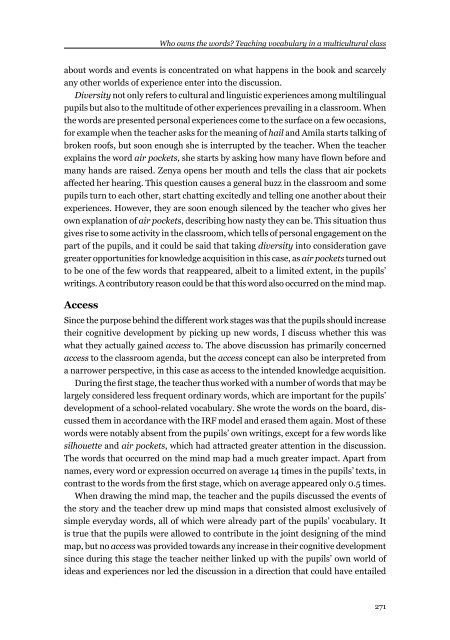Download issue - Umeå universitet
Download issue - Umeå universitet
Download issue - Umeå universitet
Create successful ePaper yourself
Turn your PDF publications into a flip-book with our unique Google optimized e-Paper software.
Who owns the words? Teaching vocabulary in a multicultural class<br />
about words and events is concentrated on what happens in the book and scarcely<br />
any other worlds of experience enter into the discussion.<br />
Diversity not only refers to cultural and linguistic experiences among multilingual<br />
pupils but also to the multitude of other experiences prevailing in a classroom. When<br />
the words are presented personal experiences come to the surface on a few occasions,<br />
for example when the teacher asks for the meaning of hail and Amila starts talking of<br />
broken roofs, but soon enough she is interrupted by the teacher. When the teacher<br />
explains the word air pockets, she starts by asking how many have flown before and<br />
many hands are raised. Zenya opens her mouth and tells the class that air pockets<br />
affected her hearing. This question causes a general buzz in the classroom and some<br />
pupils turn to each other, start chatting excitedly and telling one another about their<br />
experiences. However, they are soon enough silenced by the teacher who gives her<br />
own explanation of air pockets, describing how nasty they can be. This situation thus<br />
gives rise to some activity in the classroom, which tells of personal engagement on the<br />
part of the pupils, and it could be said that taking diversity into consideration gave<br />
greater opportunities for knowledge acquisition in this case, as air pockets turned out<br />
to be one of the few words that reappeared, albeit to a limited extent, in the pupils’<br />
writings. A contributory reason could be that this word also occurred on the mind map.<br />
Access<br />
Since the purpose behind the different work stages was that the pupils should increase<br />
their cognitive development by picking up new words, I discuss whether this was<br />
what they actually gained access to. The above discussion has primarily concerned<br />
access to the classroom agenda, but the access concept can also be interpreted from<br />
a narrower perspective, in this case as access to the intended knowledge acquisition.<br />
During the first stage, the teacher thus worked with a number of words that may be<br />
largely considered less frequent ordinary words, which are important for the pupils’<br />
development of a school-related vocabulary. She wrote the words on the board, discussed<br />
them in accordance with the IRF model and erased them again. Most of these<br />
words were notably absent from the pupils’ own writings, except for a few words like<br />
silhouette and air pockets, which had attracted greater attention in the discussion.<br />
The words that occurred on the mind map had a much greater impact. Apart from<br />
names, every word or expression occurred on average 14 times in the pupils’ texts, in<br />
contrast to the words from the first stage, which on average appeared only 0.5 times.<br />
When drawing the mind map, the teacher and the pupils discussed the events of<br />
the story and the teacher drew up mind maps that consisted almost exclusively of<br />
simple everyday words, all of which were already part of the pupils’ vocabulary. It<br />
is true that the pupils were allowed to contribute in the joint designing of the mind<br />
map, but no access was provided towards any increase in their cognitive development<br />
since during this stage the teacher neither linked up with the pupils’ own world of<br />
ideas and experiences nor led the discussion in a direction that could have entailed<br />
271

















